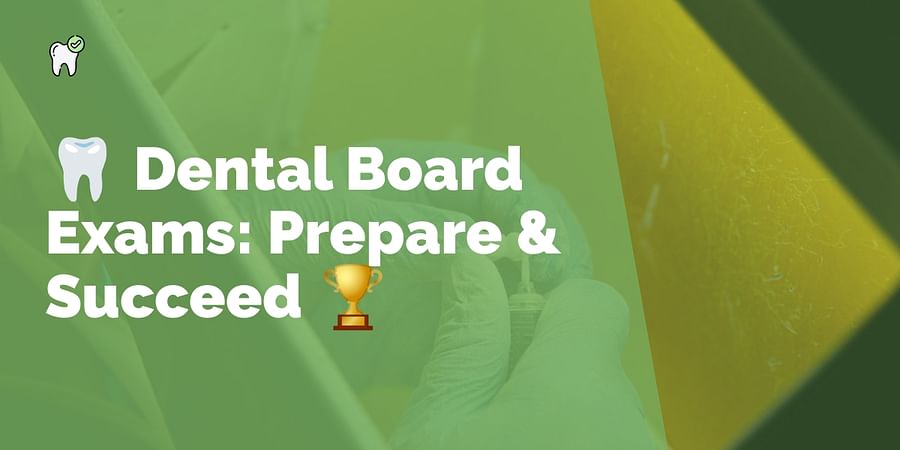Navigating Dental Board Exams: How to Prepare and Succeed in Your Licensure Journey

Before you can become a licensed dentist, you must pass the dental board exam. This exam tests your knowledge and skills in various areas of dentistry, including diagnosis, treatment planning, and patient management. It consists of two parts: the written exam and the clinical exam.
The written exam includes multiple-choice questions on topics like anatomy, pharmacology, and dental materials. It's important to manage your time effectively during this exam.
The clinical exam evaluates your ability to diagnose and treat patients. You'll be given a patient case and expected to perform procedures like dental fillings or root canals. Your communication skills, technical abilities, and clinical judgment will be assessed.
Note that the dental board exam requirements and format can vary by state, so check with your state's dental board for specific information.
Preparing for the dental board exam can be challenging, but with the right strategies, you can succeed. The next section provides tips and strategies for exam preparation.

The dental board exam requires extensive preparation. Here are some tips and strategies to help you prepare:
1. Start studying early to review all the material thoroughly.
2. Create a study schedule that covers all the topics and stick to it.
3. Use reputable study materials like textbooks, online resources, and practice exams.
4. Practice with sample exams to familiarize yourself with the format and types of questions.
5. Focus on your weak areas and spend more time studying them.
6. Join a study group to learn from others and get support.
7. Take care of your physical and mental health by getting enough sleep, exercising, and eating well.
By following these tips and strategies, you can feel more confident and prepared for the dental board exam. Good luck!
Time management is crucial during the dental board exam. The exam tests your knowledge, skills, and critical thinking under pressure. You have limited time for each section, so manage your time wisely.
Familiarize yourself with the exam format and structure before the exam. Plan how much time to allocate to each section and read the instructions carefully.
During the exam, keep track of the time and pace yourself. Don't spend too much time on one question or section. If you get stuck, move on and come back later if time allows.
Take breaks to rest and recharge. Use your break time wisely and avoid distractions.
Remember, time management is not just about finishing on time, but also maximizing your performance. Manage your time effectively to review answers and make necessary changes before submitting.

As you prepare for the dental board exam, avoid these common mistakes:
1. Not reading instructions carefully: Read everything carefully to avoid unnecessary mistakes.
2. Spending too much time on one question: Move on if you're stuck and come back later if time allows.
3. Not managing time effectively: Keep track of time and pace yourself. Don't neglect any section.
4. Not practicing enough: Practice with sample questions and exams to get familiar with the format and types of questions.
5. Not taking care of yourself: Get enough sleep, eat well, and take breaks to avoid burnout.
Avoiding these mistakes will better prepare you for success on the dental board exam.
Staying calm and confident during the dental board exam is crucial. Here are some tips to help:
1. Practice relaxation techniques: Deep breathing, meditation, or visualization can calm your nerves.
2. Stay positive: Believe in yourself and your preparation.
3. Take breaks: Use breaks to relax and refocus.
4. Don't dwell on mistakes: Move on and focus on doing your best.
5. Trust your instincts: Go with your gut feeling when answering questions.
Remember, the dental board exam is just one step in your licensure journey. Learn from your mistakes and keep working towards your goal.
After the dental board exam, be patient while waiting for your scores. Once you receive them, you'll know if you passed or failed.
If you passed, congratulations! Apply for your dental license with your state's dental board. Follow your state's specific requirements for licensure.
If you didn't pass, don't be discouraged. Reflect on your performance and areas for improvement. Seek additional study resources or work with a tutor for the next exam.
Remember, the dental board exam is just one step. With dedication and hard work, you can achieve your goal of becoming a licensed dentist.
Post a comment